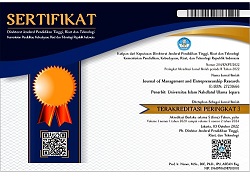Aims & Scope
Aim
Small, medium and large businesses require integrated management from various fields such as finance, marketing, human resources, operational and good governance, which are expected to improve business competitiveness. Therefore, Journal of Management and Entrepreneurship Research over to who have manuscripts focused on finance, marketing, human resources, business operations, corporate governance, small and medium enterprises as well as entrepreneurship related to micro, meso, and macro phenomena. All reports correspond to the development, engineering, and implementation of all types of businesses. Only articles with contributions will be published.
Scope
JMER invites researchers to contribute ideas on the main scope related to emerging management and entrepreneurship issues, including financial issues, marketing issues, human resource management issues, operation management issues, entrepreneurship issues, and corporate governance issues.
□ Finance Issues
□ Marketing Issues
□ Human Resource Management Issues
□ Operation Management Issues
□ Entrepreneurship Issues
□ Corporate Governance Issues
Recent literature related to journal scope























